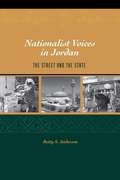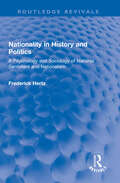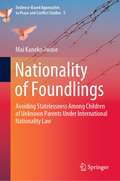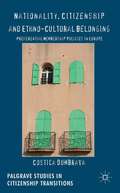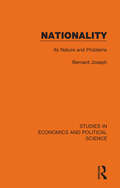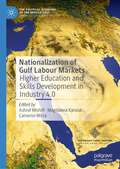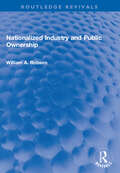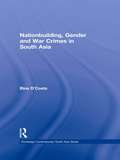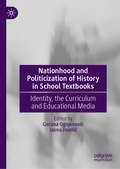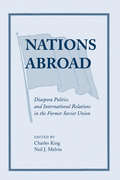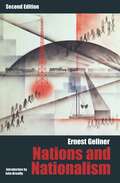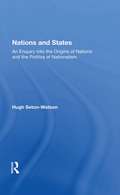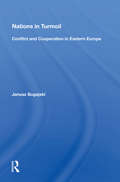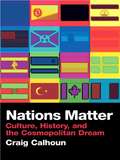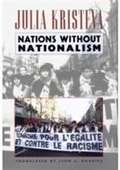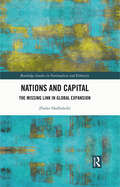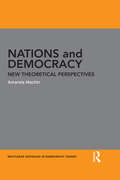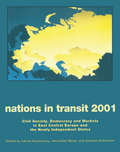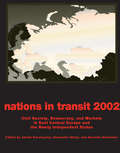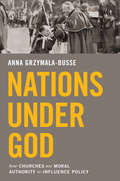- Table View
- List View
Nationalist Voices in Jordan: The Street and the State
by Betty S. AndersonAccording to conventional wisdom, the national identity of the Jordanian state was defined by the ruling Hashemite family, which has governed the country since the 1920s.<P><P> But this view overlooks the significant role that the "Arab street"--in this case, ordinary Jordanians and Palestinians--played and continues to play in defining national identity in Jordan and the Fertile Crescent as a whole. Indeed, as this pathfinding study makes clear, "the street" no less than the state has been a major actor in the process of nation building in the Middle East during and after the colonial era.
Nationality and Statelessness under International Law
by Alice Edwards Laura Van WaasWritten by leading experts, Nationality and Statelessness under International Law introduces the study and practice of 'international statelessness law' and explains the complex relationship between the international law on nationality and the phenomenon of statelessness. It also identifies the rights of stateless people, outlines the major legal obstacles preventing the eradication of statelessness and charts a course for this new and rapidly changing field of study. All royalties from the sale of this book support stateless projects.
Nationality in History and Politics: A Psychology and Sociology of National Sentiment and Nationalism (Routledge Revivals)
by Frederick HertzFirst published in 1944, Nationality in History and Politics unpacks the vagueness of terms such as nationality, national consciousness, national character, national will, national self-determination, etc. The phenomena underlying these terms are exceedingly complex, and writers frequently shift the sense according to the interest defended. National consciousness comprises a number of different aspirations which, however, can be summed up as a striving for national personality. The book investigates in detail the correlations between those aspirations and such factors as race, language, religion, territory and State, and examines in particular the social background of modern nationalism. The chapters give the sociology of national sentiment and national traditions, usually called national character, against a wide historical background. The latter part of the book treats the evolution of ideas on nationality and on supranational aims from the Middle Ages to our own time, and the influence of the doctrines of great thinkers on the national ideology of the principal nations. This book will be of interest to students of history, political science, sociology and psychology.
Nationality of Foundlings: Avoiding Statelessness Among Children of Unknown Parents Under International Nationality Law (Evidence-Based Approaches to Peace and Conflict Studies #5)
by Mai Kaneko-IwaseThis is the first book dedicated to clarifying the concept of “foundlings” and how to best prevent their statelessness in light of the object and purpose of Article 2 of the 1961 UN Convention on the Reduction of Statelessness and equivalent nationality law provisions. Among other features, the book defines the terms “foundling,” including the maximum age limit of the child to be considered a “foundling”; “unknown parents”; being “found” in a territory; and “proof to the contrary”; as well as the procedural issues such as the appropriate burden and standard of proof. In doing so, the book draws upon a comparative analysis of national legislation on “foundlings” covering 193 states, case law, and precedents in some states as well as international human rights law norms including the best interests of the child. As its conclusion, the book proposes an inclusive model “foundling provision” and a commentary to inform legislative efforts and interpretation of the existing provisions. Its findings are useful not only to state parties to the 1961 Convention but also to non-state parties, particularly in countries lacking systematic civil documentation or experiencing the effects of armed conflicts, migration, trafficking, and displacement.
Nationality, Citizenship and Ethno-Cultural Belonging
by Costica DumbravaThis book challenges mainstream arguments about the de-ethnicization of citizenship in Europe, offering a critical discussion of normative justifications for ethno-cultural citizenship and an original elaboration of principles of membership suitable for contemporary liberal democratic states.
Nationality: Its Nature and Problems (Studies in Economics and Political Science)
by Bernard JosephOriginally published in 1929, the author begins the discussion of nationality by a survey of its main factors – race, language, religion, the homeland, tradition, literature and the will to live together. With the discovery that racial purity is a myth, race in its biological sense loses much of its significance, though racial self-consciousness remains virtually unaffected. The second half of the volume studies the historical origins of nationality and its world-wide ramifications. The nationalities of Europe are briefly surveyed in a single chapter, while the British Empire, India, the Jews and the Americans, have chapters to themselves. The study of Asia is completed by an additional chapter on National Groups of the East. Towards the end of the volume the author returns to the discussion of the meaning of nationality, defines its relation to the state, Patriotism, Internationalism and war, and sums up its merits and its defects. This book is a re-issue originally published in 1929. The language used and assumptions made are a reflection of its era and no offence is meant by the Publishers to any reader by this re-publication.
Nationalization of Gulf Labour Markets: Higher Education and Skills Development in Industry 4.0 (The Political Economy of the Middle East)
by Ashraf Mishrif Magdalena Karolak Cameron MirzaThis book addresses critical aspects of the nationalization of labour markets in the Gulf countries. It examines the role of higher education institutions in providing the market with the right skills that are most needed in the era of the fourth industrial revolution (industry 4.0). The book also explores the new dynamics of technology and information systems in upgrading the skills, changing the work environment, and generating employment for the youth in the Gulf countries. The holistic approach of the subject area makes this volume indispensable to academics, researchers, students, and policy makers in the Gulf region and beyond.The book covers a broad range of topics including the nationalization of labour market programmes such as Emiratization and Saudization, attitudes toward women in workplace, the role of high-tech firms in upskilling and enhancing the productivity of workforce, while also providing sector-specific investigations in healthcare, banking, finance, tourism, and hospitality. The analysis is based on original research and primary data collected by a group of scholars from 15 countries and presented in an illustrative, accessible, and concise manner.
Nationalized Industry and Public Ownership (Routledge Revivals)
by William A. RobsonFirst Published in 1960, Nationalized Industry and Public Ownership is concerned with the state of nationalized industries in Britain in the context of the wider sphere of public enterprise in the world. It critically examines themes like the motives and background of nationalization; the state of public corporation in Britain; public utilities as monopoly; parliamentary debates and questions regarding government control; the idea of public accountability; the status of consumers’ councils, and the link between labour relations and public ownership. This book is an important historical document for scholars and researchers of public administration, political economy, British economy, labour economics and British labour history.
Nationbuilding, Gender and War Crimes in South Asia (Routledge Contemporary South Asia Series)
by Bina D'CostaThis book gives a detailed political analysis of nationbuilding processes and how these are closely linked to statebuilding and to issues of war crime, gender and sexuality, and marginalization of minority groups. With a focus on the Indian subcontinent, the author demonstrates how the state itself is involved in the construction of a gendered identity, and how control of women and their sexuality is central to the nationbuilding project. She applies a critical feminist approach to two major conflicts in the Indian subcontinent – the Partition of India in 1947 and the Liberation War of Bangladesh in 1971 – and offers suggestions for addressing historical injustices and war crimes in the context of modern Bangladesh. Addressing how the social and political elites were able to construct and legitimize a history of the state that ignored these issues, the author suggests a critical re-examination of the national narrative of the creation of Bangladesh which takes into account the rise of Islamic rights and their alleged involvement in war crimes. Looking at the impact that notions of nation-state and nationalism have on women from a critical feminist perspective, the book will be an important addition to the literature on gender studies, international relations and South Asian politics.
Nationhood and Politicization of History in School Textbooks: Identity, the Curriculum and Educational Media
by Gorana Ognjenović Jasna JozelićThis book explores how school history textbooks are used to perpetuate nationalistic policies within divided regions. Exploring the ‘divide and rule’ politics across ex-Yugoslav successor states, the editors and contributors draw upon a wide range of case studies from across the region. Textbooks and other educational media provide the foundations upon which the new generation build understanding about their own context and the events that are creating their present. By promoting nationalistic politics in such media, textbooks themselves can be used as tools to further promote and preserve ongoing hostility between ethnic groups following periods of conflict. This edited collection will appeal to scholars of educational media, history education and post-conflict societies.
Nations
by Azar GatWhat are the origins of nationalism and why is it capable of arousing such intense emotions? In this major study, Azar Gat counters the prevailing fashionable theories according to which nations and nationalism are modern and contrived or 'invented'. He sweeps across history and around the globe to reveal that ethnicity has always been highly political and that nations and national states have existed since the beginning of statehood millennia ago. He traces the deep roots of ethnicity and nationalism in human nature, showing how culture fits into human evolution from as early as our aboriginal condition and, in conjunction with kinship, defines ethnicity and ethnic allegiances. From the rise of states and empires to the present day, this book sheds new light on the explosive nature of ethnicity and nationalism, as well as on their more liberating and altruistic roles in forging identity and solidarity.
Nations Abroad: Diaspora Politics And International Relations In The Former Soviet Union
by Charles KingBased on new field research by an international team of post-Soviet specialists, Nations Abroad is the first comparative study to examine the complexities of trans-border ethnic groups and state-building in the former Soviet Union. Focusing on seven key casesJews, Armenians, Russians, Ukrainians, Kazakhs, Poles, and Volga Tatarsthis book offers unique insights into the power of diaspora politics within and between the new states of Eurasia. Political scientists, sociologists, and international relations experts will find this an indispensable guide to the complex interaction of nations and states in the post-Soviet world. Based on new field research by an international team of post-Soviet specialists, this is the first comparative study to examine the complexities of trans-border ethnic groups and state-building in the former Soviet Union.The collapse of the Soviet state transformed internal administrative boundaries into international frontiers. Russians, Ukrainians, and other ethnic groups overnight became nations abroad, communities separated from their ostensible homelands by shifting interstate borders. Since 1991, these new diasporas have had a powerful impact on minorities policy within the Soviet successor states, as well as on relations between the newly independent republics.Focusing on seven key casesJews, Armenians, Russians, Ukrainians, Kazakhs, Poles, and Volga Tatarsthis book offers unique insights into the power of diaspora politics within and between the new states of Eurasia. Political scientists, sociologists, and international relations experts will find this an indispensable guide to the complex interaction of nations and states in the post-Soviet world.
Nations And Nationalism
by John Breuilly Ernest Gellner"The second edition of this canonical text comes with a compelling introduction by John Breuilly which revists Gellner's theory in the light of contemporary debates on nationalism." ―Umut ÖzkÄrÄmlÄ, Istanbul Bilgi University First published in 1983, Nations and Nationalism remains one of the most influential explanations of the emergence of nationalism ever written. This updated edition of Ernest Gellner's now-canonical work includes a new introductory essay from John Breuilly, tracing the way the field has evolved over the past two decades, and a bibliography of important work on nationalism since 1983.
Nations And States: An Enquiry Into The Origins Of Nations And The Politics Of Nationalism
by Hugh Seton-watsonThis major book by one of the great political and social historians of our time is a study of the force of nationalism, a force that continues to shake our world. Reaching beyond nationalism as a doctrine, beyond the content, psychological origins, and analysis of that doctrine, the book represents and enquiry into all the important political move
Nations Divided
by Marjorie N. FeldThe anti-apartheid struggle remains one of the most fraught episodes in the history of modern Jewish identity. Just as many American Jews proudly fought for principles of justice and liberation in the Civil Rights Movement, so too did they give invaluable support to the movement for racial equality in South Africa. Today, however, the memory of apartheid bedevils the debate over Israel and Palestine, viewed by some as a cautionary tale for the Jewish state even as others decry the comparison as anti-Semitic. This pioneering history chronicles American Jewish involvement in the battle against racial injustice in South Africa, and more broadly the long historical encounter between American Jews and apartheid. In the years following World War II and the Holocaust, Jewish leaders across the world stressed the need for unity and shared purpose, and while many American Jews saw the fight against apartheid as a natural extension of their Civil Rights activism, others worried that such critiques would threaten Jewish solidarity and diminish Zionist loyalties. Even as the immorality of apartheid grew to be universally accepted, American Jews continued to struggle over persistent analogies between South African apartheid and Israel's Occupation. As author Marjorie N. Feld shows, the confrontation with apartheid tested American Jews' commitments to principles of global justice and reflected conflicting definitions of Jewishness itself.
Nations In Turmoil: Conflict And Cooperation In Eastern Europe
by Janusz BugajskiThis in an investigation of the sources, manifestations and implications of international conflict and co-operation throughout Eastern Europe within the broader framework of regional instabilities accompanying the post-communist transition. Tracing key historical antagonisms, the author assesses contemporary clashes within Eastern Europe and evaluates the progress and prospects for integration into the wider European community.
Nations Matter: Culture, History and the Cosmopolitan Dream
by Craig CalhounCraig Calhoun, one of the most respected social scientists in the world, re-examines nationalism in light of post-1989 enthusiasm for globalization and the new anxieties of the twenty-first century. Nations Matter argues that pursuing a purely postnational politics is premature at best and possibly dangerous. Calhoun argues that, rather than wishing nationalism away, it is important to transform it. One key is to distinguish the ideology of nationalism as fixed and inherited identity from the development of public projects that continually remake the terms of national integration. Standard concepts like 'civic' vs. 'ethnic' nationalism can get in the way unless they are critically re-examined – as an important chapter in this book does. This book is essential reading for undergraduate and postgraduate students of sociology, history, political theory and all subjects concerned with nationalism, globalization, and cosmopolitanism.
Nations Without Nationalism (European Perspectives)
by Richard Wolin Julia Kristeva Lawrence D. Kritzman Leon S. Roudiez<p>Underlying Julia Kristeva's latest work is the idea that otherness - whether it be ethnic, religious, social, or political - needs to be understood and accepted in order to guarantee social harmony. Nations Without Nationalism is an impassioned plea for tolerance and for commonality, aimed at a world brimming over with racism and xenophobia. <p>Responding to the rise of neo-Nazi groups in Germany and Eastern Europe and the continued popularity of the National Front in France, Kristeva turns to the origins of the nation-state to illustrate the problematic nature of nationalism and its complex configurations in subsequent centuries. <p>For Kristeva, the key to commonality can be found in Montesquieu's esprit general - his notion of the social body as a guaranteed hierarchy of private rights. <p>Nations Without Nationalism also contains Kristeva's thoughts on Harlem Desir, the founder of the antiracist organization SOS Racisme; the links between psychoanalysis and nationalism; the historical nature of French national identity; the relationship between esprit general and Volksgeist; Charles de Gaulle's complex ideas involving the "nation" and his dream of a unified Europe. <p>In the tradition of Strangers to Ourselves, her most recent nonfiction work, Nations Without Nationalism reflects a passionate commitment to enlightenment and social justice. As ethnic strife persists in Europe and the United States, Kristeva's humanistic message carries with it a special resonance and urgency.</p>
Nations and Capital: The Missing Link in Global Expansion (Routledge Studies in Nationalism and Ethnicity)
by Zlatko HadžidedićNations and Capital: The Missing Link in Global Expansion is a groundbreaking analysis of the ultimate reasons for the emergence of nations and nationalism, as a socio-political and geopolitical instrument in the global expansion of capitalism. The author provides the missing link in the relationship between nationalism and capitalism and offers a comprehensive critique of classical theories of nationalism, well illustrated by historical examples. He develops an original theory of nations and nationalism, relying on the assumption that the incessant widening of the gap between the capitalist elites and the labouring masses inevitably makes the endless accumulation of capital socially unsustainable. Bridging that gap without changing the structure of society becomes the paramount task for the system, which has to introduce nationalism as a social glue tailored to conceal, but also to cement, the actual polarisation of society. This book will be of great interest to advanced undergraduate students, postgraduate students, and researchers in political science, sociology, history, international relations, security studies, social and political theory, and nationalism studies.
Nations and Democracy: New Theoretical Perspectives (Routledge Advances in Democratic Theory)
by Amanda MachinA figure of enduring ingenuity, the nation has for centuries played a part on the socio-political stage. Whether centre stage or background scenery, it has featured in violent tragedies, revolutionary drama and nostalgic fable. Today, the nation is cast simultaneously in the roles of villain and hero. While it is renounced by those advocating trans-national, post-national and cosmopolitan forms of belonging, it has lately also been asserted as the solution to various social failures in liberal democracies. This appears to leave us with two alternatives: to jettison the nation in order to move towards a less parochial world, a world in which new forms of belonging underpin more inclusive politics. Or to celebrate the nation as way of ensuring the social cement that can unite a diverse society. Using the ideas of Wittgenstein and Lacan, Amanda Machin expertly explains that the overlapping and conflicting language games of the nation produce it as an object of desire in an uncertain world. The nation is not a pre-political thing but a matter of persistent political contestation and coalition. She reveals that the nation still has a vital part to play in democratic politics, but that this role is one of improvisation. While they endure as tools of emancipatory promise, nations nonetheless remain potential categories of violent exclusion. They cannot be pinned down as easily as anti-national and pro-national alternatives suggest. It is precisely the indeterminacy of the nation that gives it ongoing importance for democracy today. Providing an urgent riposte to dominant accounts, this thought provoking and highly original account demands a re-politicisation of the nation. This book will appeal to those engaged in theory and empirical research on nations and nationalism and the question of their link to democracy in a changing world, as well as those interested in psychoanalysis and Wittgenstein.
Nations and Firms in the Global Economy
by Charles Van Marrewijk Steven Brakman Harry Garretsen Arjen Van WitteloostuijnWith a new title (following the successful first edition of Nations and Firms in the Global Economy), this second edition undergraduate textbook combines the dual perspectives of international economics and international business, providing a complete overview of the changing role of nations and firms in the global economy. International Economics and Business covers the key concepts typically included in an introductory course on the global economy, supported by contemporary case studies from the international business world. The result is a practical guide to the world economy for undergraduate students in economics and business, also suitable for students in other social science disciplines. Updated to include the latest theoretical insights, data and case studies, with online quizzes, data exercises and additional reading, International Economics and Business is a lively and engaging textbook providing a complete and practical understanding of international economics and globalization through a uniquely integrated lens.
Nations and Nationalism Since 1780
by Eric HobsbawmEric Hobsbawm's brilliant enquiry into the question of nationalism won further acclaim for his 'colossal stature ... his incontrovertible excellence as an historian, and his authoritative and highly readable prose'. Recent events in Eastern Europe and the former Soviet republics have since reinforced the central importance of nationalism in the history of political evolution and upheaval. This second edition has been updated in the light of those events, with a final chapter addressing the impact of the dramatic changes that have taken place. It also includes additional maps to illustrate nationalities, languages and political divisions across Europe in the nineteenth and twentieth centuries.
Nations in Transit - 2000-2001: Civil Society, Democracy and Markets in East Central Europe and Newly Independent States
by Alexander MotylHow are democracy and market reforms faring in East Central Europe and the former Soviet Union? Is civil society expanding or shrinking? Are the media free or fettered by official constraints? To what degree are nations governed by the rule of law? Are human rights respected? Do taxation and trade policies, property rights reforms, banking laws, privatization, and macroeconomic policies encourage or encumber private sector development and economic growth?, In Nations in Transit 2001, Freedom House asked leading regional specialists and in-house experts to answer a checklist of more than 70 indicators for 27 post-Communist countries in ten key areas: political process; civil society; independent media; governance and public administration; constitutional, legislative and judicial framework; corruption; privatization; macroeconomic policy; microeconomic policy; and social sector indicators. The survey, organized in a new essay format, was reviewed by an oversight board of leading U.S. scholars and by experts from Central and Eastern and the former Soviet Union., The results are incisive, authoritative, and comprehensive country-by-country reports that assess the progress of East Central European and former Soviet countries in ridding themselves of repressive political systems and inefficient statist economies. As an added dimension, Freedom House-which for nearly 25 years has rated global political rights and civil liberties in its benchmark Freedom in the World surveys-has developed a rating system that allows for a comparative analysis of democratic and market reforms in the countries covered by the survey., Nations in Transit 2001 is an invaluable resource and reference tool for governmental and nongovernmental institutions, schools and universities, and anyone else interested in better understanding the political, economic, and legal structures and institutions that constitute the infrastructure on which the transition to open societies and markets depends.
Nations in Transit - 2001-2002: Civil Society, Democracy and Markets in East Central Europe and Newly Independent States
by Carlton J. Hayes"How are democracy and market reforms faring in East Central Europe and the former Soviet Union? Is civil society expanding or shrinking? Are the media free or fettered by official constraints? To what degree are nations governed by the rule of law? Are human rights respected? Do taxation and trade policies, property rights reforms, banking laws, privatization, and macroeconomic policies encourage or encumber private sector development and economic growth?In Nations in Transit 2000-2001, Freedom House asked leading regional specialists and in-house experts to answer a checklist of more than 70 indicators for 27 post-Communist countries in ten key areas: political process, civil society, independent media, governance and public administration, constitutional, legislative and judicial framework, corruption, privatization, macroeconomic policy, microeconomic policy, and social sector indicators.The results are incisive, authoritative, and comprehensive country-by-country reports which assess the progress of East Central European and former Soviet countries in ridding themselves of repressive political systems and inefficient statist economies. As an added dimension, Freedom House also developed a rating system which allows for a comparative analysis of countries in terms of democratic and market reforms. Nations in Transit is an invaluable resource for government and non-governmental institutions, schools and universities, and anyone else interested in better understanding the political, economic, and legal structures and institutions that compromise the infrastructure on which the transition to open societies and markets depends."
Nations under God
by Anna Grzymała-BusseIn some religious countries, churches have drafted constitutions, restricted abortion, and controlled education. In others, church influence on public policy is far weaker. Why? Nations under God argues that where religious and national identities have historically fused, churches gain enormous moral authority--and covert institutional access. These powerful churches then shape policy in backrooms and secret meetings instead of through open democratic channels such as political parties or the ballot box.Through an in-depth historical analysis of six Christian democracies that share similar religious profiles yet differ in their policy outcomes--Ireland and Italy, Poland and Croatia, and the United States and Canada--Anna Grzymała-Busse examines how churches influenced education, abortion, divorce, stem cell research, and same-sex marriage. She argues that churches gain the greatest political advantage when they appear to be above politics. Because institutional access is covert, they retain their moral authority and their reputation as defenders of the national interest and the common good.Nations under God shows how powerful church officials in Ireland, Canada, and Poland have directly written legislation, vetoed policies, and vetted high-ranking officials. It demonstrates that religiosity itself is not enough for churches to influence politics--churches in Italy and Croatia, for example, are not as influential as we might think--and that churches allied to political parties, such as in the United States, have less influence than their notoriety suggests.
